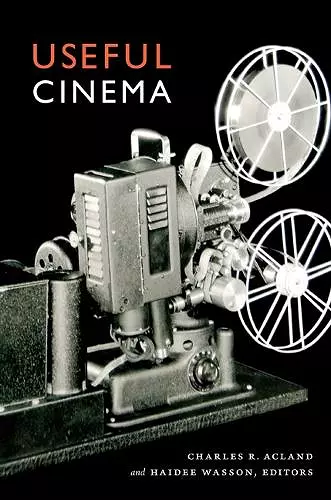Useful Cinema
Charles R Acland editor Haidee Wasson editor
Format:Hardback
Publisher:Duke University Press
Published:14th Oct '11
Currently unavailable, and unfortunately no date known when it will be back

Challenges preconceived notions about just what cinema is
By exploring the use of film in mid-twentieth-century institutions including libraries, classrooms, and professional organizations, film scholars show how moving images became an ordinary feature of American life.By exploring the use of film in mid-twentieth-century institutions, including libraries, museums, classrooms, and professional organizations, the essays in Useful Cinema show how moving images became an ordinary feature of American life. In venues such as factories and community halls, people encountered industrial, educational, training, advertising, and other types of “useful cinema.” Screening these films transformed unlikely spaces, conveyed ideas, and produced subjects in the service of public and private aims. Such functional motion pictures helped to shape common sense about cinema’s place in contemporary life. Whether measured in terms of the number of films shown, the size of audiences, or the economic activity generated, the “non-theatrical sector” was a substantial and enduring parallel to the more spectacular realm of commercial film. In Useful Cinema, scholars examine organizations such as UNESCO, the YMCA, the Amateur Cinema League, and the Metropolitan Museum of Art. They also consider film exhibition sites in schools, businesses, and industries. As they expand understanding of this other American cinema, the contributors challenge preconceived notions about what cinema is.
Contributors. Charles R. Acland, Joseph Clark, Zoë Druick, Ronald Walter Greene, Alison Griffiths, Stephen Groening, Jennifer Horne, Kirsten Ostherr, Eric Smoodin, Charles Tepperman, Gregory A. Waller, Haidee Wasson. Michael Zryd
“[T]he 13 case studies nicely illustrate the variety of institutional settings in the US that exploited the cinematic medium to shape thinking, tastes, and behaviors throughout the 20th century. . . . The overall results are engaging, provocative, and useful. Highly recommended. Lower-division undergraduates through faculty/professionals; general readers.“ - J. I. Deutsch, Choice
“Charles Acland offers here a complementary (and alternative) history of media engagement…. provides significant food for thought…. [E]xperimental film serves perhaps an unusual, but still a legitimate, purpose.” - Liz Giuffre, Media International Australia
“A wholly solid collection of new research in a blossoming area of study. Each of Useful Cinema’s articles offers unique, substantial, and interesting work that will engage and benefit any scholar even peripherally interested in the socio-cultural and socio-political dimensions of educational or industrial film. . . . As broad as its subject matter may be, the volume is unified by a rigorous standard of archival scholarship, a remarkable tendency to build interest and delight in unexpected topics, and a consistency of accessible writing that clearly illuminates how film and media are used to write and rewrite social histories.” - Andrew James Myers, Mediascape
“Education is commonly understood as opposed to entertainment. But this rich and fascinating volume puts the lie to such an assumption. It shows how, across the decades, ‘useful cinema’ was measured in relation to Hollywood entertainment and indeed interacted with it in a complex fashion. Useful Cinema does so through essays that are themselves compelling and captivating, eloquent and enjoyable. The book is itself, in other words, a masterful blend of the entertaining and the useful.”—Dana Polan, New York University
“This valuable book reveals how moving images proliferated beyond the spectacular confines of theaters to become deeply embedded in everyday life, cultures, and institutions. The publication of this fascinating anthology is a welcome sign that film historians are starting to forgo their longtime fascination with mass-produced glamour and make peace with cinema’s most utilitarian, and numerically dominant, genres.”—Rick Prelinger, founder of Prelinger Archives
“[T]he 13 case studies nicely illustrate the variety of institutional settings in the US that exploited the cinematic medium to shape thinking, tastes, and behaviors throughout the 20th century. . . . The overall results are engaging, provocative, and useful. Highly recommended. Lower-division undergraduates through faculty/professionals; general readers.“ -- J. I. Deutsch * Choice *
“A wholly solid collection of new research in a blossoming area of study. Each of Useful Cinema’s articles offers unique, substantial, and interesting work that will engage and benefit any scholar even peripherally interested in the socio-cultural and socio-political dimensions of educational or industrial film. . . . As broad as its subject matter may be, the volume is unified by a rigorous standard of archival scholarship, a remarkable tendency to build interest and delight in unexpected topics, and a consistency of accessible writing that clearly illuminates how film and media are used to write and rewrite social histories.” -- Andrew James Myers * Mediascape *
“Charles Acland offers here a complementary (and alternative) history of media engagement…. provides significant food for thought…. [E]xperimental film serves perhaps an unusual, but still a legitimate, purpose.” -- Liz Giuffre * Media International Australia *
ISBN: 9780822349976
Dimensions: unknown
Weight: 748g
400 pages